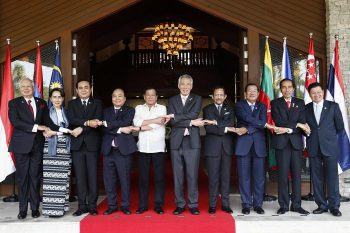风萧萧_Frank
以文会友法专家:西方必须走出认知误区 直面现实的中国
最近几年来,西方政治以及经济学者撰写的有关中国的书籍可谓汗牛充栋,但真正能够理性地,现实的描述中国的政治社会,分析中国崛起对西方造成何种影响的书籍却屈指可数。法国知名学者,法国国际关系学院(IFRI)亚洲中心研究员 Sophie Boisseau du Rocher与 法国智库托马斯·摩尔学院(Institut Thomas More) 中国问题研究员 Emmanuel Dubois de Prisque 近日推出的新书:中国与世界,就是其中之一, 该书的书名一词多意,也可以翻译成中国是世界。 两位作者发表此书的目的是为了让法国,乃至欧洲的读者了解一个真实的中国,而不是他们意想中的中国,他们认为,只有在知己知彼的前提下,才能够展开真正的对话。
Sophie Boisseau du Rocher 是一位高级研究员,专门研究东南亚政治、地缘战略事务和区域一体化。 2015 年 11 月至 2023 年 12 月,她担任 Ifri 亚洲研究中心的副研究员。她是众多书籍和文章的作者
中国是/和世界看中国全球化
Sophie Boisseau du Rocher、Emmanuel Dubois de Prisque 一月 23, 2019
Sophie Boisseau du Rocher 是 IFRI(法国国际关系研究所)亚洲中心的研究员。作为东南亚问题专家,她对该地区与中国的关系进行了实地考察。 Emmanuel Dubois de Prisque 是托马斯莫尔研究所的助理研究员,也是《亚洲新中国》杂志的联合主编。他在东亚工作了二十五年,曾在日本和台湾生活过。
中国重塑的全球体系及其利益的捍卫会是什么样子?全球平衡是否受到威胁,或者我们是否正在目睹对规则的务实改革,而这些规则无论如何都不再适应未来的挑战?西方应该与这个力量并肩作战,还是对抗它?当唐纳德·特朗普领导的美国主张民族主义撤军时,欧洲还有牌可打吗?坚定的国家主席习近平宣布了这些计划:到 2049 年成为世界第一强国。因此,如果中国准备主宰二十一世纪,了解其特质、动机和行为就势在必行。
本研究的目的是描述中国感知世界的方式,并打算改变它以使其有利。这本书展示了中国有能力利用其所掌握的所有载体和实践——硬实力、软实力和锐实力——让世界相信它所发明的中国全球化(天下)的吸引力,并轻而易举地改变了游戏规则(例如,制定新的工业和环境规范)。通过这样做,中国正在取代以前的西方治理,一种可能成为子孙后代规范的新治理。这一雄心壮志并非没有风险:对于中国人、对于世界其他地区以及对于人文共享资源的管理。
东南亚与威权诱惑·中国模式的影响
IFRI 副研究员 Sophie Boisseau du Rocher 和 Thomas More 研究所研究员 Emmanuel Dubois de Prisque
2017 年 6 月 • 注释 24
近年来,中国习近平一直在东南亚国家测试其权威而复杂的“模式”的吸引力。泰国、马来西亚和菲律宾等国引入“民主”是否可以被视为加强中国模式及其在这些政权眼中吸引力的结果?看来是这样:在中国和这些国家一样,民主和法治越来越被视为危及稳定和繁荣的乌托邦。
西方国家梦想建立一个按照其形象塑造的世界、民主计划体现了对更光明未来的承诺的时代早已一去不复返了。在1997年危机的政治动乱之后,我们认为东南亚的案件已经解决:在很大程度上加剧了动乱的威权主义崩溃给实施涉及所有公民有益的民主进步的机制带来了希望,即一项规则保障公民、法律和政治平等的法律。
但实质上:除了通过中国强国迅速恢复增长(这种复苏实际上暂停了改革的实施)之外,2001 年 9 月 11 日的事件还通过削弱新建立的民主结构对这次革新产生了双重影响和机制,并在政治空间中恢复军事因素(武装部队)。从间歇性的动荡到深刻的危机,东南亚的政治转型并不是线性发生的;我们今天看到的肆无忌惮的暴行预示着民主过渡的黯淡未来。
在工作过程和互动中,中国因素并不是最不重要的。这一因素通过建立相互依赖关系在多个方面得到体现,这种相互依赖关系或多或少地限制了像企业这样的领导者与流动的联系,这些流动可能潜在地将该地区与依赖模式联系起来,这似乎适合更深入地探索。一个关键的根本问题是:中国的压力和东南亚所表现出的威权诱惑同时出现是否巧合?它宣布了什么?
中国根据不同领域或多或少地表现出的压力是在全球化的背景下发生的,这种全球化在历史上以殖民影响为标志,涉及与外部世界的权力关系和自我妥协。恰恰在今天,我们观察到面对西方化的一种抵抗感,这种西方化最初是由殖民统治强加的,其次是由殖民统治强加的。通过自由全球化,长期以来,自由全球化一直以粗暴而浮夸的方式宣扬“市场民主”的优点;人们认为,在1997年危机后的公民抗议之后,亚洲价值观被搁置,但习近平巧妙地复兴了这些价值观,以解释为何拒绝接受受操纵的选民仲裁的个人权利和政治竞争的支配,并奉承征服民族主义。自我妥协的形式是捍卫代表更高利益而获得的利益和捍卫政治文化。著名的民主价值观的普遍性受到人们的关注。中国现在希望在思想和价值观领域留下自己的印记。
这种质疑既助长了影响西方国家的危机,也助长了中国模式所谓的吸引力。目前,时间的伸缩偏差正在对中国有利。欧盟持续的经济疲软、美国经济放缓以及这些地区面临的地缘政治、移民和文明挑战,削弱了基于自由保障的政治体制必然有利于增长和发展的证据,并最终增加一个国家的力量。欧洲民粹主义的兴起、英国脱欧和唐纳德·特朗普当选美国总统等事件都让东南亚对民主实践的相关性甚至优点提出了深刻的质疑。相反,中国在过去30年中经历的增长、其在国际舞台上实现稳定和增强实力的能力,增强了人们对将政治自由与经济自由脱钩的兴趣。此外,由聚合和积极的利益联合起来的精英的存在,控制和服从社会的其他部分,可能成为权力的必要条件,因为这个精英以国家利益的名义“纠正”公众舆论的任何错误。 。中国当局正是这种新的威权平衡与民主的缺陷和风险日益形成鲜明对比。东南亚是首选的试验场。
因此,自 2008 年金融危机以来,我们观察到了一种渐进但实质性的独裁趋势,这种趋势在不同的国家以不同的形式出现,但标志着远离民主治理,或者更简单地说是法治,顺便说一句,领导人甚至企业都远离民主治理,甚至是企业。 ,从未完全订阅。在威权诱惑、民主腐败和公民的新要求之间,很难看清东南亚国家的政治发展。任何比较都可能显得过于简单化。然而,三个国家似乎比其他国家面临更大的风险,值得特别关注:马来西亚、泰国和菲律宾。这些国家现在将为我们的假设提供例证。
China Is/and the WorldA Look at Sino-globalization
Sophie Boisseau du Rocher, Emmanuel Dubois de Prisque January 23, 2019
Sophie Boisseau du Rocher is research associate at the Centre Asie of the IFRI [French Institute for International Relations]. A specialist in Southeast Asia, she does fieldwork on the region’s relations with China. Emmanuel Dubois de Prisque is research associate at the Institut Thomas More and co-editor-in-chief of the journal Monde Chinois nouvelle Asie. He has been working for twenty-five years on East Asia and has lived in Japan and Taiwan.
What will a global system remodeled by China and the defense of its interests look like? Are global balances threatened, or are we witnessing a pragmatic overhauling of rules that in any event were no longer adapted to the challenges of the future? Should the West accompany that power, or confront it? Does Europe have a card to play when Donald Trump’s United States is arguing for a nationalist withdrawal? The plans have been announced by a determined President Xi Jinping: by 2049 to be the foremost world power. And so, if China is preparing to dominate the twenty-first century, understanding its idiosyncrasies, its motivations, and its behavior is imperative.
The goal of this study is to describe the way in which China perceives the world and intends to modify it to its advantage. The book shows China’s ability to use all the vectors and practices at its disposal – hard, soft, and sharp power – to convince the world of the attractiveness of a Sino-globalization that it has invented (Tianxia) and, with a light hand, transformed the rules of the game (the development of new industrial and environmental norms, for example). In doing so, China is substituting for the former Western governance a new governance that might become the norm for future generations. An ambition that is not without risks: for the Chinese, for the rest of the world, and for the management of humanities shared resources.
South-East Asia and authoritarian temptation · The impact of the Chinese model
Sophie Boisseau du Rocher, Associate Researcher at IFRI, and Emmanuel Dubois de Prisque, Research Fellow at the Thomas More Institute
 June 2017 • Note 24
June 2017 • Note 24




